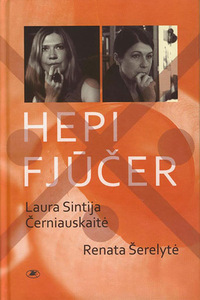Vision of the future in the present moments 3
In brief: It can be argued that Černiauskaitė and R. Šerelytė literary experiment has succeeded. The book surprisingly combines seemingly incompatible things - L. S. Černiauskaitė classic, romantic style, psychologism and R. Šerelytė sharp plot, futuristic motifs. Perhaps, because both authors depict errant, lying contemporary people, who are fragile and confused inside.
Generally, Lithuanian writers collaborate in preparing collections and anthologies. A different type of author cooperation is rare in literature. But literary experiments are always intriguing and surprising. Two well-known novelists - Laura Sintija Černiauskaitė ir Renata Šerelytė composed a joint collection of short stories Hepi Fjūčer (Hepi Fjūčer, 2015, Vilnius: Lithuanian Writers' Association publishing house). Book contains 18 short stories grouped in pairs, like a game, which a reader will have to play in order to discover similarities and differences between these writers.
Although both authors write differently, the book inevitably forces the reader to look for links between their works. It should be noted that the book combines the worldview of both authors as well as spiritual atmosphere of short stories. But the most important feature linking the short stories of L. S. Černiauskaitė and R. Šerelytė is that both authors write about contemporary people lost in the world and within. Readers can easily recognize themselves or others in their short stories.
It is interesting that after each short story authors provide the circumstances under which they wrote them. They also reveal what mood was accompanying them while writing and what they were hearing and seeing through the window at that moment. Such comments really complement each novel. When pairing up short stories, writers were looking for similar titles, topics, characters or keywords.
In her short stories L. S. Černiauskaitė often depicts women and gives much attention to mother and child relationship. The characters in novellas are women of different social backgrounds, distraught, tired of themselves and the environment but seeking for love and understanding. Psychological opening-ups and expressive details are very important in the L. S. Černiauskaitė novellas.
R. Šerelytė novellas bear a lot of social criticism. Her characters are often businessmen, members of the parliament, judges. She creates their tragicomic portraits filled with satire.

